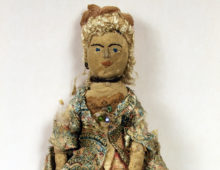Tagged with Trade
Resource : Captain Cook voyages through The British Library
June 13, 2018 - Richard Moss
The British Library follows the journeys of the man who opened up the world during the Age of Revolution in James Cook: The Voyages Captain James Cook’s name has always been synonymous with exploration and adventure, but even in the 1770s when the American Revolutionary War was underway, such was his fame that none other […]
Resource : View of New Lanark by John Winning
Throughout the 1800s Britain became a busy industrial nation. People migrated in increasing numbers from the countryside to towns and cities to work in new factories and mills. Working conditions were poor and dangerous, injuries from machinery were common and workers – including children as young as six – worked long hours. Overcrowding, limited diets and polluted water led to widespread disease and early death. New Lanark, a village on the River Clyde near Glasgow, was a revolutionary industrial and housing complex, combining a cotton mill with purpose-built housing, education and social care for its workers and their families. The ideas put into practice here marked the beginning of cooperative socialism.
Resource : Nelson’s Coat
This coat was worn by Admiral Lord Horatio Nelson when he commanded the British fleet at the Battle of Trafalgar, in 1805. In this major sea battle, the British navy defeated the combined fleets of the French and Spanish navies, temporarily ending Napoleon Bonaparte’s threat to invade Britain. Although this coat made Nelson highly conspicuous during the battle, he chose to wear it on deck to inspire his men. Nelson was shot at the height of the battle and mortally wounded. The bullet hole can be seen on the left shoulder of the coat.
Resource : The Blessings of Peace or the Curse of the Corn Law
This satirical cartoon, by George Cruikshank, is a comment on what became known as the Corn Laws – one of the most unpopular pieces of legislation ever to be introduced by the British Government.
Resource : The interesting narrative of the life of Olaudah Equiano or Gustavus Vassa, the African
Olaudah Equiano was an African-born writer who documented his experiences of capture and enslavement, worked and travelled all over the British Atlantic world, and later became involved in the movement to abolish slavery. He was among the first and most effective black political activists within Britain’s African community. The recollections and arguments of people of African origin made a profound contribution to arguments for the abolition of the slave trade, adding urgency and authenticity to the work of fellow white campaigners.
Resource : A New Map of Africa
In 1805 large tracts of the continent of Africa remained unknown in Britain and Europe. Mapmakers were quick to draw on new information, newly sophisticated measuring instruments, and new consumer interest in the wider world. Their efforts produced maps that were more scientific and objective on one level, but remained deeply coloured by their biases and preconceptions.
Resource : Anti-slavery sugar bowl
Between the 1500s and early 1800s, millions of Africans were kidnapped, sold and transported to the Americas to work as slaves in unimaginably cruel conditions on hugely profitable plantations. These plantations were largely owned by Europeans and Euro-Americans. Britain grew rich on the profits from this transatlantic slave trade, reinvesting the profits in other economic sectors. Only in the late eighteenth century did public opinion slowly begin to turn against the trade in Africans, and campaigners for abolition used every way they could to bring the issue to people’s attention in Europe.
Resource : Challenging slavery: abolition and opposition
The campaign for the abolition of Transatlantic slavery, acts of resistance by those who were enslaved, and opposition from those who stood to benefit from the brutal trade in African people.
Resource : Bust of Jean-Jaques Dessalines (1758 – 1806)
Jean-Jacques Dessalines (1758 – 1806) was born into slavery in St Domingue (now Haiti) on the Caribbean island of Hispaniola. Following a mass uprising of enslaved people of African origin – the only successful slave revolt in history – and a series of bloody battles and reprisals, Dessalines eventually became the first ruler of Haiti, the world’s first modern independent ‘black’ republic. The events in St Domingue became known as the Haitian Revolution.
Resource : Roll Jordan Roll
Roll Jordon Roll is a spiritual, sung by enslaved Africans working on plantations in the Americas in the 1800s in resistance to their enslavement and cruel treatment.


